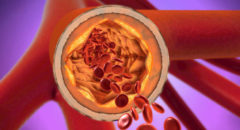
Cardiovascular disease is the leading cause of maternal death in the U.S. Black women, in particular, are at high risk of life-threatening pregnancy-related complications. This is a lesson Shemellar Davis, unfortunately, learned from first-hand experience.
She was just 29 when she was diagnosed with postpartum cardiomyopathy (a form of pregnancy-related heart failure) and high blood pressure after giving birth to her second son.
The diagnosis was discovered during an echocardiogram, which doctors performed after Davis expressed that she wasn’t feeling well.
The heart ultrasound found the culprit to be an enlarged heart struggling to function.
However, Davis didn’t realize the seriousness of the disease until about three weeks later when her mother passed away at age 52 from complications of congestive heart failure.
BlackDoctor.org sat down with the volunteer for the American Heart Association’s Go Red For Women “Real Women” initiative to discuss her diagnosis, erasing stigma, the importance of knowing your family history, how women can stay healthy during pregnancy, and what she learned from her experience.
After giving birth to your second child, you were diagnosed with postpartum cardiomyopathy and high blood pressure. Can you walk me through that experience?
After I was diagnosed with these conditions, I didn’t understand the seriousness of these conditions. I assumed that “postpartum” meant that it would go away soon after the postpartum period. I didn’t understand the severity until my mother passed away from congestive heart failure, three weeks later.
What were some of the symptoms you were experiencing? What was going through your mind at this time?
I didn’t have any symptoms that I considered abnormal during the pregnancy; tiredness and swollen ankles can be indicative of pregnancy. After the pregnancy and diagnosis, I did experience heart palpitations quite frequently. In my mind, I thought the medication would cure my condition. I was also worried about how the medication would affect my breast milk and ultimately my son.
RELATED: Heart Failure at Age 30: “I Was Absolutely Terrified”
A few weeks later your mom passed away from heart failure, which prompted you to prioritize your health more. Can you talk about this? What type of changes did you begin making?
I became obsessive with my diet, which included no added salt, low sodium, and only organic foods. As time passed, I learned I should have








